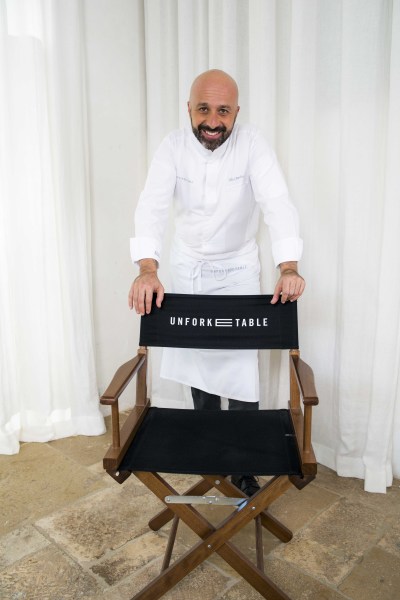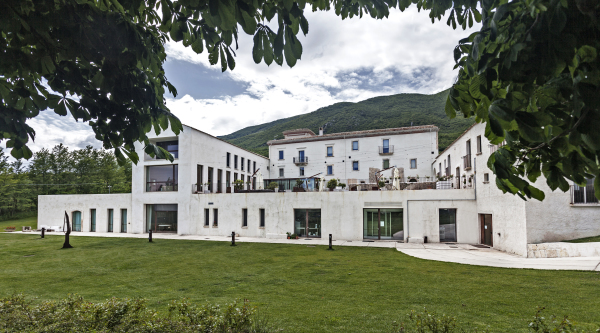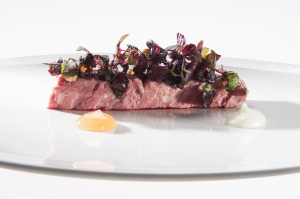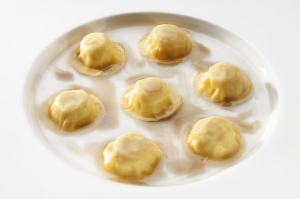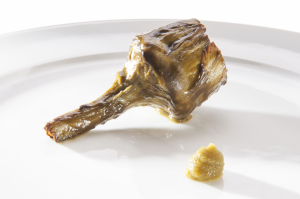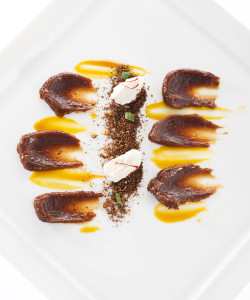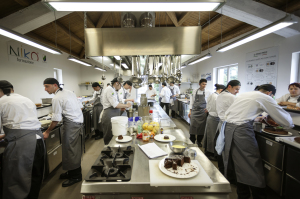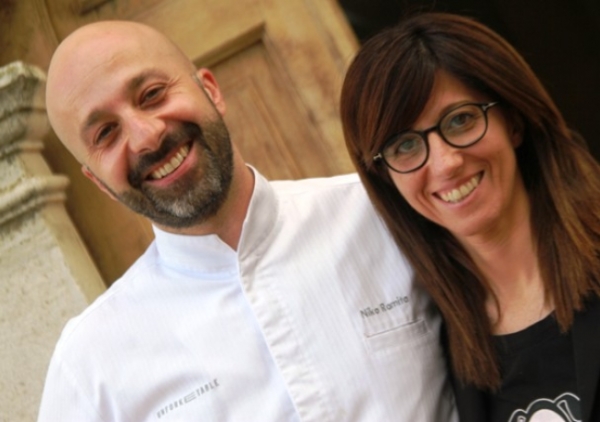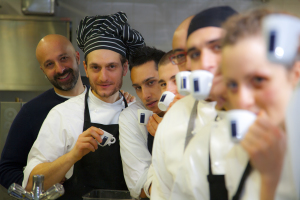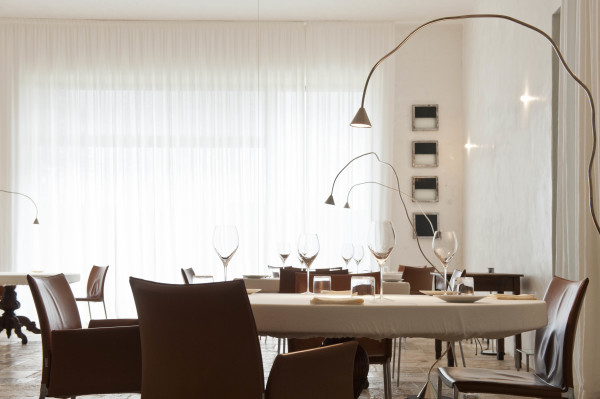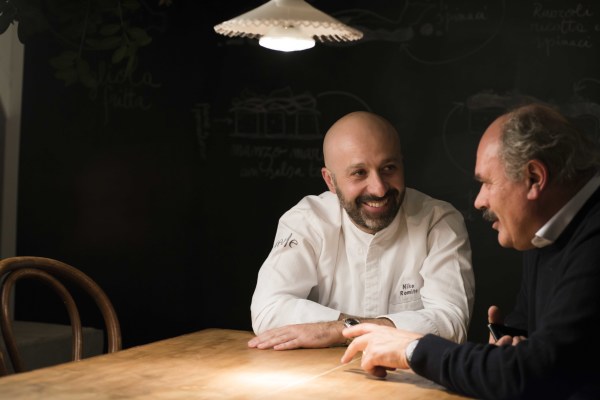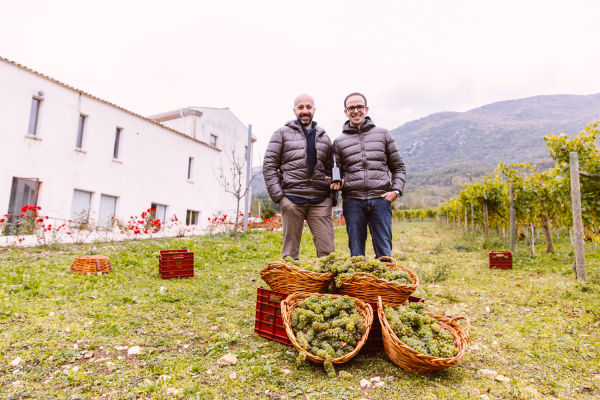NIKO ROMITO:
ITALY’S ONLY CHEF SOUTH OF ROME WITH THREE MICHELIN STARS
On November 5, 2013, Niko Romito, the timid, taciturn and modest, 39-year-old chef of the restaurant “Reale” in Castel di Sangro in the province of L’Aquila, was awarded his third Michelin star for the 2014 edition of the guide. Born in nearby Rivisondoli, where his father owned a pastry shop, which in 1996 he transformed into the trattoria “Reale,” Niko dreamed of working in finance and so was studying economics at the University of Rome. However, two years later, when his father got sick and died soon thereafter, he returned to Rivisondoli and from 2000 ran the trattoria “Reale” with his sister Cristiana.
In the beginning Romito lacked experience and so started doing internships with famous chefs: Antonio Sciullo, another Abruzzese who knew his father; Salvatore Tassa; the Roco brothers in Girona in Catalonia (today voted the second best restaurant in the world after NOMA in Copenhagen), where he worked as a dishwasher for a month, and then with Valeria Piccini at “Caino” in Montemerano in the Maremma in Tuscany where his first task was cleaning artichokes, but also where he understood “the importance and courage of investing in a restaurant that wasn’t in a city and which had only 20 seats, and then above all of respecting the raw materials and not manipulating them.”
In 2007 Romito was awarded his first Michelin star and in 2009 his second. That same year he won the “Creativity Award” at Identità Golose. In 2011 he won the “Best Chef Award” at Identità Golose and moved “Reale” to Casadonna, a beautifully restored 16th-century ex-convent near Castel di Sangro. In 2012 he founded his school of top-class gastronomy and in 2013 “Spazio,” a laboratory/restaurant where his students complete their studies. In February 2014 at Identità Golose he presented his latest project at that time, a video of his recipes Unforketable, and met with Lucy Gordan, our Europe Bureau Chief.
Our tastes in food are closely connected to our childhood; what are your first memories of food?
My first memories of food are connected to my grandfather. My favorite dishes as a child were: pancotto or bread soup with vegetables, roast chicken grilled in our fireplace, and all the salami and sausages my grandfather prepared according to local traditions after we slaughtered our pigs.
How would you define Italian cuisine?
Italian cuisine was born at home using local ingredients. Instead French cuisine was born in restaurants.
In a nutshell how would you define your cuisine?
Clear-cut, sincere, simple innovation, prepared in a way that is understandable and appreciable to everyone.
What are your signature dishes, other specialties?
The most recent additions to my menu.
An Abruzzese characteristic of your cuisine?
Its local ingredients.
What are the essential qualities of a top chef?
Study, research, team work, complicity, the ability to work and feel at home in different places, and humility. A chef never perfects all these characteristics or achieves all his goals.
What do you like best about your job?
The creativity.
The least?
The lack of free time.
During your presentation at Identità Golose 2014 you talked about your culinary philosophy; can you explain it for my readers?
At February’s Identità Golose I wanted to emphasize the importance of two concepts: silence and luxury. Chefs have to be quiet. Their goal shouldn’t be explained with words; they should be synthesized in their dish. We shouldn’t talk about our dishes before they’ve been tasted. When I refer to Italian cuisine as a luxury, I don’t mean it’s glitzy. I mean it involves hard-working young people, the study of ingredients, dedication, creativity and professional development. All this has a cost. Cooking is a splendid luxury, one which let’s us explore the world and also brings us fame as chefs.
I recently interviewed Heinz Beck who talked to me about the importance of helping young chefs at the start of their careers. You’ve started an international cooking school that runs its own restaurant called “Spazio” or “Space.” It’s next door to your restaurant “Reale,” which was awarded its third Michelin star this year. Can you tell me more about your school and its restaurant “Spazio”?
Training young people is fundamental to me. Because of this personal need of mine Niko Romito Formazione was born. It’s a professional school for learning how to prepare top-level cuisine. Thanks to the direct interaction with my restaurant “Reale,” to continuous workshops with the best experts in this field, to the didactic collaboration with the University of Gastronomic Sciences at Pollenzo and with Slow Food, during the past three years Niko Romito Formazione has become a formative and cultural center of absolute excellence.
Out of this context “Spazio” was born. It was thought of, studied, developed and dedicated exclusively for the young people attending my school. It’s an experiment in putting into practice the concepts they’ve acquired. We’re not talking here about a new restaurant, but rather a laboratory in which my students are the protagonists.
Give me some details about your latest project called “Unforketable?
Unforketable is my view of Italian cuisine for household use. A project in partnership with Pasta Garofalo, it’s an encyclopedic video of Italian taste with recipes edited by me. All the recipes on this video are purchasable from the site www.unforketable.com. The project’s mission is to promote, describe, and explain Italian cuisine above all abroad. It’s an authentic on-line school. All you need is a username and a password to access and look at any video you’ve purchased.
You are very young to have three Michelin stars; what do you think are the reasons for your success?
For me, for my sister Cristiana, and all of our team the third Michelin star represents a departure point, not the finish line. We cannot lose sight of our principles, our culinary research, our work with different ingredients and natural resources, and above all we mustn’t forget the importance of research and of our professional development.
What does the third Michelin star signify for you?
As my press release says, “It is simply the realization of a dream. It’s a fantastic result that recompenses all my choices and hard work. I want to share this joy with my sister Cristiana and my tireless team because this third star is without a doubt a team victory. For anyone who asks us what comes next, I answer that we will continue to work hard without losing sight of our principles: constant culinary research, work on the ingredients and on our raw materials, without forgetting the importance of our research and formative projects like Niko Romito Formazione and gastronomic culture like Unforketable. Almost certainly, of the 105 restaurants with three Michelin stars around the world, “Reale” is the least expensive with its tasting menu at 100 euros.
Other chefs that you admire?
Everyone who does this job professionally and passionately.
Who was your mentor and what did you learn from him or her?
I didn’t have a mentor. My career path is different from my colleagues. I‘m self-taught. I didn’t go to hotel management school. I studied economics at university. I started being a chef at a much older age than most.
Tell me something about your team?
Again, as my press release says, “It’s made up of young people like us, who have an enormous desire to grow professionally and to develop ideas. We want to emphasize that the recognition we received with the third star fills us with pride and spurs us to do better and better. For us it’s a departure point not the finish line or goal. From the very start we believed in our territory, the Abruzzi, and we took off from here. We decided to stay here and it’s here in Castel di Sangro that we want to continue to work.
What’s our opinion of food critics and restaurant guides? Have they helped you?
What’s your opinion of TV food shows?
Instead of always concentrating on chefs, they should interview producers and feature local products in specific locations.
Up to now we’ve talked about Niko Romito the chef and teacher; Id like to know more about Niko Romito the person. For example, what are your favorite foods?
I don’t have one or two particular favorites.
A dish you don’t like?
I don’t like coconut so I don’t use it in my cuisine.
Your favorite wines?
I don’t like complicated “constructed” wines. It’s important to me that a wine reflects the territory it comes from whatever that may be.
Your favorite dessert?
Desserts that aren’t sweet.
Your favorite color?
Blue.
What is never missing in your refrigerator at home?
Lemons and tomatoes.
Chefs are well-known for having collections, often of motorcycles, fast cars, or watches; what about you?
Cookbooks. I own lots and lots of them.
If you hadn’t become a chef, what other profession would you have chosen??
I studied economics at the university of Rome. I would have liked to be a stock broker, financial analyst and advisor. In short a creative job in the world of finance.
What is your dream for the future?
To create a real model for developing Italian cuisine abroad.
Epilogue: Since Identità Golose, Romito’s creativity has never slowed down. Last spring ever-generous Romito opened for the summers only a second “Spazio,” run by his ex-students as an internship for his students about-to-complete their studies, at Capo Faro, at the resort of the famous wine-producing family Tasca d’Almerita on the Aeolian island Salina off north-east Sicily.
Even more recently Oscar Farinetti, the inventor and owner of all the mega-stores “Eataly” worldwide, recruited Romito to open another “Spazio” at “Eataly” in Rome on November 19th. It is open for lunch and supper six days a week. Closed Wednesday. At a press conference held at Rome’s Eataly to announce this new collaboration Farinetti said, ”We are extremely enthusiastic about collaborating with Niko Romito. Niko will be our gem. He will give us more clout and improve our image. I like Niko and I love his cuisine; above all I love “Spazio.” Such a project is in keeping with ‘Eataly’ because it unites teaching with business. Niko is the youngest of Italy’s great chefs and his “Spazio” will give space … to the talent of many young cooks. It will be a place for everyone, the employees and the clients, to meet and to share experience. I’m convinced that is formula that will be a great success at ‘Eataly’.”
“’Spazio’ at Rome’s ‘Eataly’,” added Romito, “under the guidance of my collaborators Gala Giordano and Enrico Camello, will create opportunities for young chefs in Rome. The menu will bring my country philosophy to the big city; it will be in continuous evolution; it will change every month and will be focused on some symbolic products in that season. I am happy to test myself with some traditional Roman dishes with a new ‘Romito’ twist; for example, panzanella with Roman-style tripe. Although it will be a gourmet restaurant with 70 seats, the average price will be 35 euros for three courses. I would like Rome’s to be the first of a series of ‘Spazio’ openings in large cities, but for now I’m just focusing on launching this first one well.”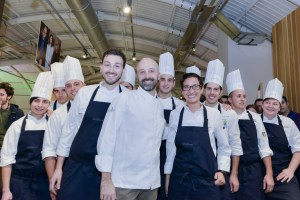
Thanks to its open industrial archeology layout, guests will have the chance to talk directly with the chefs, who will move from their stoves to the dining room to explain their “creations,” their preparation, and the choice of their ingredients.
Lucy, our Europe Bureau Chief, was lucky to be invited to the inaugural dinner of “Spazio” in Rome, which featured a tasting menu of fried pizza; bresaola; pasta e fagioli; fried anchovies and mozzarella balls; chicken with artichokes and potatoes; and fried bombe (donuts filled with crema pasticiera). The layout’s style is coherent with Casadonna’s: wooden floors, large blackboards with the menu of the day, tables illuminated as an island, a very simple mise-en-place with no tablecloths, but a linen napkin.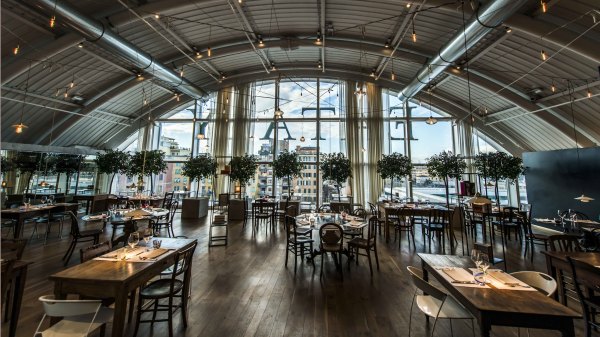
In addition to his “Spazio” restaurants, Romito is a mover-and-shaker wine producer in partnership with the “Feudo Antico” cellar, one of Italy’s smallest. In 2010 “Feudo Antico” planted an experimental vineyard on Romito’s Casadonna Estate in Castel di Sangro, at an altitude of 1,390 feet. They have just put on sale the 800 bottles from their first hand-picked grape harvest of “Pecorino IGP Terre Aquilane 2013 for Casadonna,” an organic, structured, yet fruity white wine with quite a high alcohol content, made 100% of Pecorino grapes, a rare autochthonous species that had become almost extinct. (“Feudo Antico”, Via Perruna, 66010 Tollo, Chieti), tel. 0871-969128, www.feudoantico.it).
For more articles by Lucy Gordan, click her name below the title of this article.
& & &

